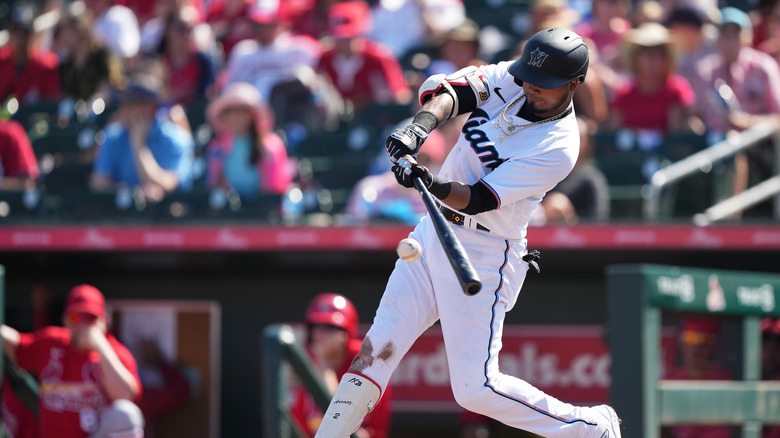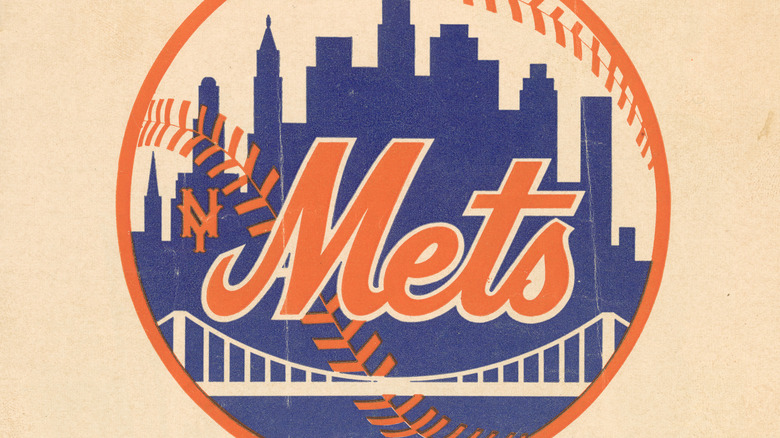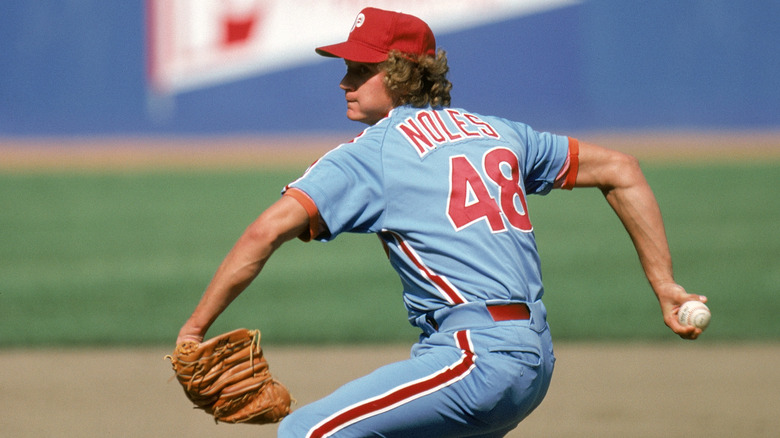The MLB's Strange Habit Of Trading Players For Themselves
Major League Baseball can sometimes seem a little strange, especially compared to other professional sports, like football, basketball, and soccer, which tend to take a more straightforward approach to how they're played. The game has some oddities, including its convoluted and arcane rules that even the league's umpires sometimes seem unsure of and that once left ESPN asking, "Does anybody out there know the rules of baseball?"
So perhaps the MLB's weird habits around trading players aren't really that out of place. While the idea of a team trading a player for one to be named later stands alone among professional sports, this isn't even the oddest thing concerning baseball trades. In 1994, the Cleveland Indians paid the Minnesota Twins for outfielder Dave Winfield with an expensive dinner. Minor Leagues have made even crazier deals, including the Chattanooga Lookouts taking a live turkey in a trade back in 1930. Independent Leagues may be the worst for this. In 1998, the Pacific Suns traded pitcher Kenny Krahenbuhl to the Greenville Bluesmen for 10 pounds of catfish, among other things. "Any player that gets traded for a couple of fish is not going to like it," Krahenbuhl later said, per "Going, Going, Gone! The Art of the Trade in Major League Baseball."
The first player to be traded for himself
At least Harry Chiti can thank his lucky stars that when his ball club traded him in 1962, it was for neither fish nor fowl but for himself. He was playing for the Cleveland Indians (now Guardians). Perhaps playing is a stretch — the club traded him to the New York Mets for a player to be named later before he'd even played a single game with the Indians. Chiti had bounced around the majors for more than a decade with stints as a catcher with the Chicago Cubs, Kansas City Athletics, Detroit Tigers, and the Baltimore Orioles.
With the Mets, he had a lackluster .195 batting average with no runs batted in over 15 games. The Mets sent him back to Cleveland for the player to be named later, which was him. Since this was an MLB first, Chiti couldn't seem to outrun this infamous trade. "I sure do keep hearing about it," Chiti, who later became a sheriff's deputy in Tennessee after finishing his career in the minors, told the Fort Lauderdale News in 1986. Chiti was the first but not the last MLB player to suffer this strange fate. In 1980, the New York Yankees traded catcher Brad Gulden to the Seattle Mariners for $100,000, Larry Milbourne, and a player to be named later. But after less than two dozen games, the Mariners shipped Gulden back to the Yankees the next year, completing the trade with Gulden as the player to be named.
This happened to several other players, too
The Detroit Tigers picked up Dickie Noles, a pitcher for the Chicago Cubs, in September 1987. And yes, the deal involved the player-to-be-named clause. The Tigers were in a division race against the Toronto Blue Jays and hoped Noles could help. And he initially did — Noles' first game with the Tigers was a good one. He helped them beat the Boston Red Sox 8 to 5. But his next two games were disastrous, and a month after Noles had arrived in Detroit, the Tigers sent him packing back to whence he came using the same method employed with the Brad Gulden and Harry Chiti trades, making him the third player in MLB history traded for himself. Soon after, Noles became a free agent and ended his career with the Philadelphia Phillies in 1990.
The latest MLB player to be traded for himself was John McDonald, an all-rounder who played nearly every position, from pitcher to shortstop, for eight teams during his 16-season career in the big leagues. In 2005, the Toronto Blue Jays traded him to the Detroit Tigers. And a little more than three months later, he was back in Toronto. McDonald joked it wasn't much better than being traded for "a bag of balls," per MLB Trade Rumors. At least they didn't trade him for dinner, a live turkey, or dead fish.


